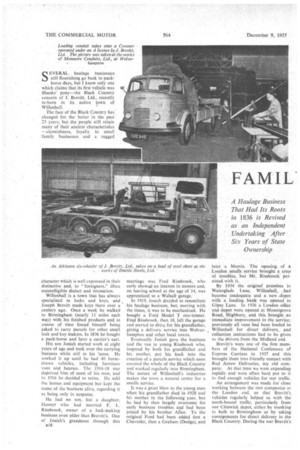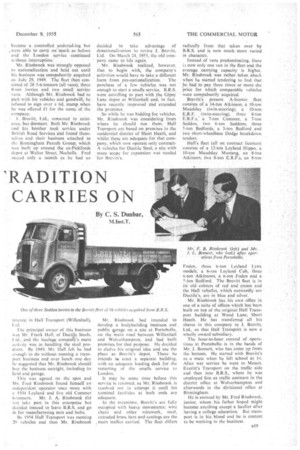FAMIL
Page 52

Page 53

If you've noticed an error in this article please click here to report it so we can fix it.
1RADITIO1N
CARRIES 01\
SEVERAL haulage businesses still flourishing go back to packhorse days, but I know only one which claims that its first vehicle was Shanks' pony—the Black Country concern of J. Brevitt, Ltd., recently re-born in its native town of Willenhall.
The face of the Black Country has changed for the better in the past 25 years, but the people still retain many of their ancient characteristics —clannishness, loyalty to small 'family businesses and a rugged character which is well expressed in their distinctive and, to "foreigners," Often unintelligible dialect and intonation.
Willenhall is a town that has always specialized in locks and keys, and Joseph Brevitt made keys there over a century ago. Once a week he walked to Birmingham (nearly 11 miles each way) with his finished products and in course of time found himself being asked to carry parcels for other small lock and key makers. In 1836 he bought a pack-horse and later a carrier's cart.
His son Josiah started work at eight years of age and took over the carrying business while still in his 'teens. He worked it up until he had 40 horsedrawn vehicles, including furniture vans and hearses. The 1914-18 war deprived him of most of his men, and in 1916 he decided to retire. Ile sold the horses and equipment but kept the name of the business alive, regarding it as being only in suspense.
He had no son, but a daughter, IIennyt who had married F. L. Rissbrook, owner of a lock-making business even older than Brevitt's. One of Josiah's grandsons through this B18 marriage was Fred Rissbrook, who early showed an interest in motors and, on leaving school at the age of 14, was apprenticed to a Walsall garage.
In 1919, Josiah decided to resuscitate his haulage business, but, moving with the times, it was to be mechanized. He bought a Ford Model T one-tonner. Fred Rissbrook, then 18, left the garage and started to drive for his grandfather, giving a delivery service into Wolverhampton and other local towns.
Eventually Josiah gave the business and the van to young Rissbrook who, inspired by both his grandfather and his mother, put his back into the creation of a parcels service which soon covered the whole of the Black Country and worked regularly into Birmingham. The nature of Willenhall's industries makes the town a natural centre for a smalls service.
It was a great blow to the young man when his grandfather died in -1928 and his mother in the following year, but he had by then largely overcome his early business troubles and had been joined by his brother Allan. To the original Ford had been added first a Chevrolet, then a Graham (Dodge), and later a Morris. The opening of a ,London smalls service brought a crop of troubles, but Mr. Rissbrook persisted with it.
By 1934 the original premises in Waterglade Lane, Willenhall, had become inadequate and a new depot with a loading bank was opened in Gipsy Lane. In 1936 a London office
• and depot were opened at Mountgrove Road, Highbury, and this brought an • immediate improvement in the service; previously all vans had been loaded in Willenhall for direct delivery, and collection instructions had to be given to the drivers from the Midland end.
Brevitt's were one of the first members of the National Conference of Express Carriers in 1937 and this brought them into friendly contact with Red Arrow Deliveries, my old company. At that time we were expanding rapidly and were often hard put to it to find enough vehicles for our traffic.
An arrangement was made for close working between the two companies at the London end, so that Brevitt's vehicles regularly helped us with the north-bound traffic, particularly from our Chiswick depot, either by trunking • ir. bulk to Birmingham or by taking consignments for direct delivery in the Black Country. During the war Brcvitt's became a eontrolled undertaking but , were able to carry on much as before and the London service 'continued ithout interruption,'
Mr. Rissbrook was strongly opposed to nationalization and held out until his business was compulsorily acquired on July 29, 1949, The fleet then cOnsisted 'of 28 5-6-tanners (all vans), three 8-ton lorries and two small service saris. Although Mr. Rissbrook had-to. part with his vehicles and goodwill, he .. refused to sign over a 6c1.. stamp .when he was offered fl for the name of -the
company. .
• J. Brevitt,• Ltd., remained in exist7 ence, but dormant. Bath. Mr. Rissbrook and his brother took service 'under British Road Services and found themselves and their business attached to the Birmingham Parcels Group, which was built up around the ex-Pickfords depot at Walter Street, Nechells. Fred stayed only a month as he had an
interest in 'Hall Transport (Willenhall), Ltd.
The principal owner of this business was Mr. Frank Hall, of Ductile Steels,rid., and the haulage compatic's main activity was in handling the steel produels. By 1949, Mr. Hall felt he had enough to do without running a transport business and over lunch one day he suggested that Mr. Rissbrook should buy the business outright, including its land and garage.
This was agreed on the spot and Mr, Fred Rissbrook •found himself an independent operator once more with a 1934 Leyland and five 'old Commer 6-tonners. Mr. J. A. Rissbrook did not take part in this enterprise but decided instead to leave B.R.S. and. go in for manufacturing nuts and bolts.
By 1954 Hall Transport was running 20 vehicles and then Mr. Rissbrook decided to take advantage of denationalization to revive I. Brevitt, Ltd.OrrMarch 24, 1955,•the old corn. pany came to life again.
Mr. Rissbrook realized, however, that to begin , with, the company's activities would have to take a different form from pre-nationalization. The purchase of a few Vehicles Was not enough to start a smalls service, B.R.S. were unwilling to part with the Gipsy Lane depot at .Willenhall and in fact, have recently improved grid extended the premises. . .
So while he was •bidding 'for. vehicles, Mr. Rissbrook was considering 'froin where he should run them:. Half Transport are based on-premises in the residential district of Short Heath, and whilst these arc adequate for that company, which now operate only contractA vehicles for Ductile Steel, a site with. more scope for expansion was needed 'for fires Mr. Rissbrook had intended to develop a bodybuilding business and public wage on a site at Portobello, on the main road between Willenhall and Wolverhampton, and had built premises for that purpose. He decided to shelve his original idea and use the place as Brevitt's depot. There he intends -tel, erect a separate building. with art adequate loading deck for the restarting of the smalls service to London.
It may be some time before this service is resumed, as Mr. Rissbrook is tesolVed not to attempt it, until his terminal facilities at both ends are adequate.
In the meantime, Brevitt's are fully occupied with heavy movements; wire chain and other wirework, steel, extruded brass bars and castings are the main traffics carried. The fleet differs radically from that taken over by B.R.S. and is now much more varied in character.
Instead of vans predominating, there now only one van in the fleet and the average carrying capacity is higher. Mr. Rissbrook was rather taken aback when he started tendering to find that he had to pay three times or more the price for which comparable vehicles were compulsorily acquired.
Brevitt's present A-licende fleet consists Oa 14 ton Atkinson, a 10 ton Maudslay (twin-steering), a 10-ton. E.R.F. (twin-steering), three 8-ton E.R.F.s; a 7-ton Commer, a 7-ton Seddon. two 6-ton Seddon& three 5-ton Bedfords, a 3-ton Bedford and two short-wheelbase Dodge breakdown tenders.
Hall's fleet (all on contract licences) consists of a 12-ton Leyland Hippo, a 10-ton Maudslay Mustang, an 8-ton Atkinson, two 8-ton E.R.F.s, an 8-ton
FOden., three •64an . Leyland'. Lynx Models,' a • 6-tan -Leylarld Cub; three 6-torr.AtkinspitS a 6-ton Foden and a 5-ton •Bedfard: The Brt'iviti fleet is in its old .colours Of red and cream and the 'Hail'VeliideS, WhiCh Outwardly. are
Ditctile's; are in blue and 'silver. . •
Mr. Rissbrook has, his own office in one of a Suite of Offices which has been built on top Of the.origitial Hall Transport building at Wood Lane, Short Heath.He has transferred. all his
shares in this company to Brevitt, Ltd„ so that Hall Transport is now a
wholly -owned subsidiary. . • The hour-to-hour control of operations at Portobello is in the hands of Mr. J. Bennett, who has .come up from the :bottom. He started with Brevitt's as. a mate when he left school at 14. After war service he went to Messrs. Everitt'sTransport an the traffic side and then into .B.R.S., where he was employed first as traffic assistant in the district office at Wolverhampton and afterwards in the divisional office at . Birmingham. •
• He is assisted by Mr. Fred Rissbrook, junior, whom his father hoped might become anything except a haulier after having a college education. But transport is in his blood and he is content to be working in the business.




















































































































